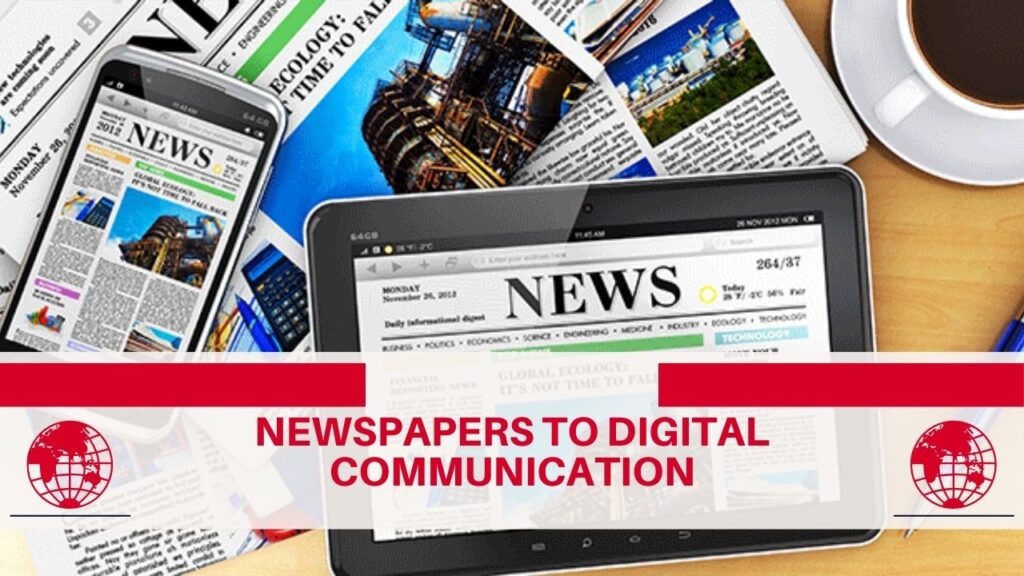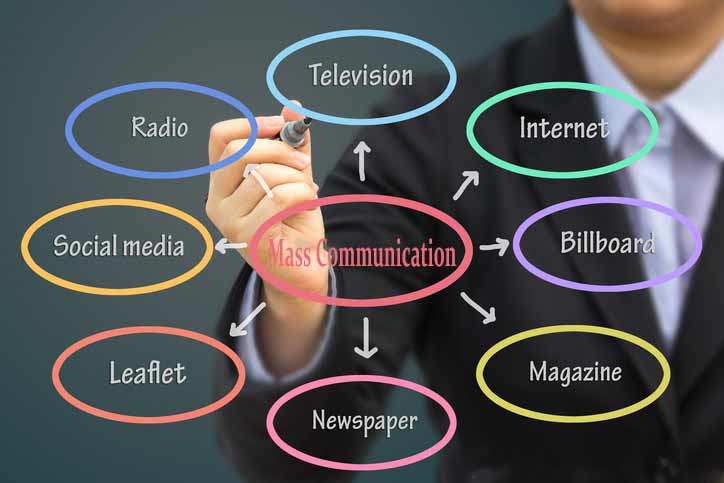Mass communication offers a wide variety of career options for those with an interest in media and entertainment. It is especially beneficial to students who have good people skills, as many roles in this field require dealing with clients and colleagues on a daily basis.
If you are considering making a career in Mass Communication, this article is for you.
Mass Communication: Where People Connect and Ideas Flourish

When we hear the term “mass communication,” the meaning is clear – the interaction and exchange of ideas among people on a large scale. However, there’s much more to this field than meets the eye.
It helps with:
- Bridging the Gap: Mass Comm serves as a bridge, connecting individuals from different cultures, backgrounds, and geographical locations. It breaks down barriers and fosters understanding and empathy among people who may otherwise have limited interactions.
- Amplifying Voices: It provides a platform for marginalized voices and underrepresented communities to be heard. It gives them the opportunity to share their stories, perspectives, and experiences with a wider audience, creating a more inclusive and diverse media landscape.
- Promoting Dialogue: It encourages dialogue and healthy discussions on important social, political, and cultural issues. Mass Communication provides a space for people to exchange ideas, debate differing viewpoints, and work towards finding common ground, leading to a more informed and engaged society.
- Spurring Social Change: Through mass communication, individuals and organizations can raise awareness about social injustices, advocate for human rights, and mobilize communities for positive change. It has the power to galvanize movements, drive activism, and bring about tangible societal transformations.
- Education and Empowerment: This field serves as a valuable tool for education and empowerment. It disseminates knowledge, shares educational resources, and empowers individuals with information necessary for personal growth, decision-making, and civic engagement.
- Cultural Preservation and Promotion: It plays a crucial role in preserving and promoting diverse cultures and traditions. It showcases artistic expressions, celebrates cultural heritage, and encourages cross-cultural appreciation, fostering a sense of unity amidst diversity.
- Economic Impact: Mass Comm is also a significant driver of economic growth and development. It fuels industries such as media, advertising, entertainment, and digital technology, creating job opportunities, stimulating entrepreneurship, and contributing to the overall economy.
- Global Connectivity: Today, mass communication has transformed the world into a global village, enabling instant communication and connections across continents. It facilitates international collaborations, fosters cross-cultural understanding, and promotes global citizenship.
- Entertainment and Inspiration: It provides entertainment that enriches our lives, offering a range of content including films, music, literature, and online platforms. It inspires creativity, sparks the imagination, and offers an escape from daily routines, contributing to overall well-being.
- Information Dissemination: A career in mass communication means that you become a part of an industry that serves as a reliable source of information, keeping individuals informed about current events, scientific discoveries, technological advancements, and social trends. It enables people to make informed decisions, participate in democratic processes, and stay connected to the world around them.
In summary, mass communication is essential for connecting people, fostering dialogue, and facilitating the exchange of ideas. It promotes cultural understanding, empowers individuals, and drives social change. Through its various forms and mediums, mass communication plays a vital role in shaping societies, amplifying voices, and building a more informed and engaged global community.
The world of mass communication offers a plethora of exciting opportunities, where you can excel and make a difference. Let’s explore the essence of mass communication, its significance in our lives, and the various fields within it.
The Power of Mass Communication: Connecting the World

Imagine a world without the internet, television, newspapers, or radio. Even in earlier times, newspapers played a vital role in disseminating information to the masses, illustrating that mass communication existed long before the term itself was coined.
The origins of mass communication can be traced back to the development of various means of communication throughout human history. Here is a brief overview of how mass communication came into being:
- Oral Tradition: In ancient times, before the invention of writing systems, communication relied on oral tradition. People passed down stories, knowledge, and information through spoken words, allowing for the transmission of messages to larger groups of people.
- Writing Systems: The invention of writing systems, such as cuneiform in Mesopotamia and hieroglyphs in Egypt, marked a significant milestone in mass communication. Writing enabled information to be recorded, stored, and shared across time and space, reaching larger audiences beyond immediate oral interactions.
- Printing Press: The invention of the printing press by Johannes Gutenberg in the 15th century revolutionized mass communication. It allowed for the mass production of books, newspapers, and other printed materials, making information more accessible to a broader range of people. The printing press facilitated the dissemination of knowledge, ideas, and news on a larger scale.
- Industrial Revolution: The Industrial Revolution in the 18th and 19th centuries brought advancements in technology, transportation, and communication. These developments, such as the steam-powered press and the telegraph, further accelerated the spread of information and facilitated faster communication over long distances.
- Mass Media: The 20th century witnessed the rise of mass media as a dominant form of mass communication. The invention of radio, television, and cinema allowed for the broadcast of information, entertainment, and news to a mass audience. These mediums transformed communication by reaching millions of people simultaneously and influencing public opinion.
- Digital Revolution: The advent of the digital age in the late 20th century and the widespread use of the internet in the 21st century revolutionized mass communication once again. The internet enabled instant global communication, breaking down geographical barriers and providing a platform for the exchange of information, ideas, and multimedia content on an unprecedented scale.
Today, mass communication encompasses a wide range of mediums, including print media, broadcasting, online platforms, social media, and mobile communication.
The evolution of technology and the constant innovation in communication tools continue to shape the field of mass communication, making it more accessible, interactive, and dynamic than ever before. It has evolved into a dynamic and essential part of our lives, enabling us to connect, learn, and engage with the world around us.
The Evolution of Mass Communication: From Newspapers to the Digital Age

As technology advances, so does the field of mass communication. From traditional print media to the emergence of television and radio, and now the vast digital landscape, mass communication has undergone a remarkable transformation.
With the rise of the Internet, social media, and mobile devices, information flows freely, transcending geographical boundaries and reaching people in real time. This evolution has opened up countless career avenues for those passionate about mass communication.
Here are some ways in which the digital age has helped and influenced mass communication:
- Instantaneous Communication: Digital technology, particularly the internet and mobile devices, enables instant communication across vast distances. People can now share information, ideas, and news in real-time, breaking down barriers of time and space, allowing for immediate dissemination of information to global audiences.
- Global Reach: The internet has made it possible for mass communication to reach a global audience. As mentioned above, this has created opportunities for cross-cultural exchange, global dialogue, and the sharing of diverse perspectives.
- Interactive and Participatory Communication: The digital age has transformed mass communication from a one-way flow of information to a two-way interactive process. Social media platforms, online forums, and comment sections on websites allow audiences to actively engage with content, express their opinions, and participate in discussions.
- Multimedia Integration: Digital technology has enabled the integration of various forms of media into a single platform. Text, images, audio, and video can be combined seamlessly, providing richer and more engaging communication experiences.
This has opened up new possibilities for storytelling, entertainment, and the presentation of information, making mass communication more visually appealing and immersive.
- Democratization of Communication: The digital age has democratized mass communication by lowering the barriers to entry. Anyone with internet access and basic technological literacy can create and distribute content, bypassing traditional gatekeepers and media intermediaries.
This has empowered individuals and grassroots movements to have a voice and share their perspectives, challenging the dominance of mainstream media and fostering greater diversity in mass communication.
- Data-Driven Insights: Digital platforms generate vast amounts of data about user behavior, preferences, and engagement. This data can be analyzed to gain insights into audience interests, trends, and demographics.
Mass communication professionals can leverage this data to tailor content, target specific audiences, and optimize communication strategies for greater impact and effectiveness.
- Monetization Opportunities: The digital age has opened up new avenues for monetizing mass communication. Online advertising, sponsored content, e-commerce, and subscription models provide revenue streams for content creators and media organizations.
This has allowed for the sustainability and growth of digital media outlets and created opportunities for new business models in the field of mass communication.
Overall, the digital age has revolutionized mass communication by expanding its reach, enabling interactivity, enhancing multimedia integration, empowering individuals, providing data-driven insights, and creating new monetization opportunities. It has fundamentally transformed the way information is created, shared, and consumed, shaping the present and future of mass communication.
Why Mass Communication Matters in Today’s World

In our present era, mass communication is more crucial than ever before. It serves as a lifeline for businesses, governments, organizations, and individuals alike.
Through mass communication channels, we gain access to valuable knowledge, entertainment, news, and diverse perspectives. It empowers us to make informed decisions, drives societal progress, and fosters a sense of global interconnectedness.
Diverse Fields in Mass Communication: Finding Your Niche
Within the realm of mass communication, numerous fields offer exciting and fulfilling career paths. Here are just a few examples:
- Journalism
- News Anchoring
- Copywriting
- Cinematography
- Radio Broadcasting
These are merely a handful of opportunities in the vast landscape of mass communication. Each field requires unique skills, talents, and dedication, providing avenues to excel and impact the world.
Is a Career in Mass Communication Right Fit for You?

As you contemplate a career in mass communication, evaluating your people skills is crucial. Strong interpersonal communication, empathy, networking abilities, and conflict-resolution skills are vital for success in this field.
Reflect on your strengths, interests, and aspirations, and consider how your people skills align with the demands of mass communication. By nurturing and developing these skills, you can pave the way for a rewarding and fulfilling career where you can effectively connect with people and make a lasting impact through communication.
Embrace the Power of Mass Communication and Forge Your Path
As mass communication continues to expand and evolve, it has become an indispensable force in our lives. In this ever-changing landscape, a career in mass communication offers the chance to connect, inform, entertain, and inspire. If you have a passion for communication, the ability to adapt to new technologies, and a desire to make a difference, then consider venturing into the exciting world of mass communication.
Embrace the challenges, seize the opportunities, and let your voice be heard in this vibrant field that shapes the way we connect and share ideas.
Remember, success in any job comes with its fair share of challenges. It’s up to you to embrace those challenges, acquire the necessary skills, and forge a fulfilling career in mass communication.
So, if you are ready to embark on a journey where you can think of others and provide them with the right information, ensuring a safer and more informed society, then mass communication awaits your creative spirit and passion for making a difference.

